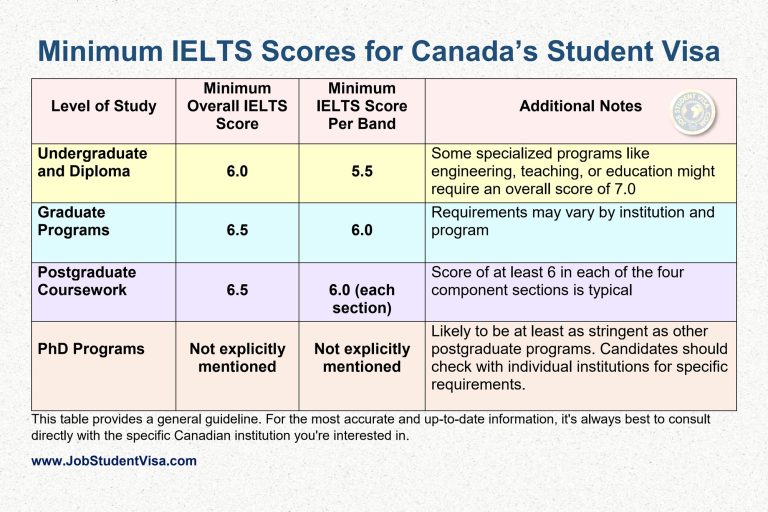IELTS Requirements for Immigration Visa in Canada: Detailed Guidelines
Do you aspire to start afresh in Canada? Your path initiates with grasping the vital importance of the International English Language Testing System (IELTS) in obtaining your immigration visa for Canada. In this comprehensive guide, we delve into the specifics of IELTS requirements, offering valuable insights and practical advice for aspiring immigrants. Whether you’re a student, professional, or family member aiming for Canadian shores, mastering the IELTS is a pivotal step in your immigration process. Join us as we unfold the essential aspects of IELTS preparation, scoring benchmarks, and strategic tips to elevate your language proficiency for a successful Canadian visa application.
IELTS Score Requirements for Canadian Immigration Visa
Navigating the path to Canadian immigration can be complex, and language proficiency is a key component. The International English Language Testing System (IELTS) is one of the primary benchmarks used by Immigration, Refugees, and Citizenship Canada (IRCC) to assess the English language skills of prospective immigrants. This comprehensive guide delves into the intricacies of IELTS requirements for various Canadian immigration programs, offering vital insights for those aspiring to settle in Canada.

Introduction to IELTS for Canadian Immigration
IELTS is an internationally recognized English language proficiency test. It’s designed to evaluate the language skills of individuals who wish to work or study in environments where English is the primary language of communication. In the context of Canadian immigration, IELTS serves as a standardized measure to ensure that immigrants can effectively integrate into both the professional and social aspects of Canadian life. The test assesses abilities across four core areas: listening, reading, writing, and speaking.
Types of IELTS Tests
IELTS is categorized into two distinct types: IELTS Academic and IELTS General Training. While the IELTS Academic test targets those aiming for higher education or professional registration in English-speaking contexts, it is the IELTS General Training test that is mandatory for immigration-related applications. It focuses on the basic survival skills in broad social and workplace contexts and is less academically focused than the Academic version.
Understanding the IELTS Scoring System
IELTS results are conveyed in the form of band scores, which range from 1, being the lowest, to 9, the highest achievable score. Each skill area – Listening, Reading, Writing, and Speaking – is given a band score, and the overall band score is the average of these four. This granular scoring allows immigration officials to assess an applicant’s strengths and weaknesses in different aspects of language use. The band scores are reflective of the user’s ability to use and understand English. For example, a band score of 6 indicates a competent user, while a score of 8 represents a very good user.
IELTS Requirements for Different Immigration Programs
1. Express Entry
- Federal Skilled Worker Program (FSWP): This program requires a minimum band score of 6.0 in each of the four areas. This program is tailored for skilled professionals with overseas work experience who are seeking permanent immigration to Canada.
- Federal Skilled Trades Program (FSTP): For this program, the minimum requirement is a band score of 5.0 in Speaking and Listening, and 4.0 in Reading and Writing. It’s tailored for skilled workers who want to become permanent residents based on being qualified in a skilled trade.
- Canadian Experience Class (CEC): The requirements here vary depending on the job classification. For managerial jobs (NOC 0) or professional jobs (NOC A), a minimum of 6.0 is required in each ability, and for technical jobs and skilled trades (NOC B), a minimum of 5.0 is necessary.
2. Provincial Nominee Programs (PNPs)
- Each province in Canada has its own PNP with unique requirements. Some provinces might require lower IELTS scores, especially if the province is looking to fill specific labor shortages. Prospective immigrants should check the specific requirements of the province they are interested in.
3. Family Sponsorship
- Although language proficiency is not a strict requirement for family sponsorship programs, demonstrating a certain level of English proficiency can be beneficial. It can aid in the integration process and is sometimes taken into consideration during the application process.
| Immigration Program | IELTS Test Required | Minimum Band Score Requirement per Section | Notes |
|---|---|---|---|
| Federal Skilled Worker Program (FSWP) | General Training | Listening: 6.0 Reading: 6.0 Writing: 6.0 Speaking: 6.0 | For skilled workers with foreign work experience aiming for permanent residency. |
| Federal Skilled Trades Program (FSTP) | General Training | Listening: 5.0 Reading: 4.0 Writing: 4.0 Speaking: 5.0 | Tailored for skilled trade workers seeking permanent residency. |
| Canadian Experience Class (CEC) | General Training | Varies based on job classification (NOC code). Typically: Listening: 6.0 Reading: 6.0 Writing: 6.0 Speaking: 6.0 for NOC 0, A jobs; Listening: 5.0 Reading: 5.0 Writing: 5.0 Speaking: 5.0 for NOC B jobs | For those with Canadian work experience. The score depends on the job type. |
| Provincial Nominee Programs (PNPs) | General Training | Varies by province | Each province has its own criteria; some might have lower IELTS requirements. |
| Family Sponsorship | Not Strictly Required | Not Applicable | Demonstrating English proficiency can be beneficial but is not a primary requirement. |
Note: This table simplifies complex information and should be used as a general guide. Prospective immigrants should always verify the specific requirements for their chosen program or province, as immigration policies and requirements can change.
Also Read:
Importance of Language Proficiency in CRS Score
In the Express Entry system, language proficiency is a critical factor in determining your Comprehensive Ranking System (CRS) score. Applicants with higher IELTS scores can receive more points, enhancing their chances of receiving an Invitation to Apply (ITA) for permanent residency. The CRS score is a tool used by IRCC to rank interested applicants against each other. Points are allocated based on criteria such as age, educational background, work experience, and proficiency in language.
Preparing for the IELTS Test
Achieving a high score in IELTS requires diligent preparation. It is essential to acquaint yourself with the format of the test. IELTS has a specific structure, and understanding this structure can help in effectively managing the test-taking time. Regular practice using sample tests is highly beneficial. Many online resources, as well as preparatory books and classes, are available for this purpose. Language preparation courses, either online or in-person, can also be very effective, especially for those who need more structured or guided study.
Test Validity and Retaking the Test
IELTS test results are valid for two years. Candidates can retake the test if they are not satisfied with their scores or if their scores have expired. However, it is important to consider the preparation time and the availability of test dates, as these factors can affect the overall timeline of the immigration process.
Submission of IELTS Results
When applying for immigration, the test results need to be submitted as a part of the application process. This typically involves uploading an electronic copy of your Test Report Form (TRF) on the relevant IRCC platform or through other specified means.
Alternatives to IELTS
While IELTS is widely accepted and popular, it is not the only English language test recognized for Canadian immigration. Alternatives like the Canadian English Language Proficiency Index Program (CELPIP) are also accepted. Prospective immigrants should choose the test that best aligns with their strengths and preparation style.
Conclusion
For those aspiring to immigrate to Canada, understanding and meeting the IELTS requirements is a critical step. A high IELTS score not only meets a fundamental immigration requirement but can also significantly enhance the overall strength of an application. With proper preparation and a clear understanding of these requirements, candidates can increase their chances of a successful immigration journey to Canada.






